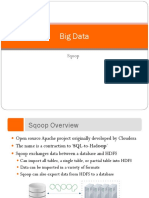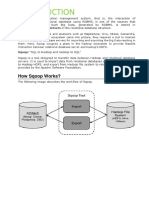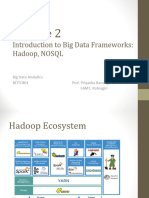0% found this document useful (0 votes)
49 views4 pagesPractice Assignment
Sqoop is a tool for transferring bulk data between structured data stores like relational databases and Apache Hadoop. It allows importing and exporting large amounts of data between databases and Hadoop's HDFS. Sqoop supports full and incremental loads, parallel imports and exports, importing SQL query results, compression, connectors for major databases, Kerberos security, and loading data directly into Hive and HBase. Its key features include robustness, parallelism, support for full and incremental loads, importing SQL query results, compression, connectors for databases, and security integration.
Uploaded by
hitaarnavCopyright
© © All Rights Reserved
We take content rights seriously. If you suspect this is your content, claim it here.
Available Formats
Download as PDF, TXT or read online on Scribd
0% found this document useful (0 votes)
49 views4 pagesPractice Assignment
Sqoop is a tool for transferring bulk data between structured data stores like relational databases and Apache Hadoop. It allows importing and exporting large amounts of data between databases and Hadoop's HDFS. Sqoop supports full and incremental loads, parallel imports and exports, importing SQL query results, compression, connectors for major databases, Kerberos security, and loading data directly into Hive and HBase. Its key features include robustness, parallelism, support for full and incremental loads, importing SQL query results, compression, connectors for databases, and security integration.
Uploaded by
hitaarnavCopyright
© © All Rights Reserved
We take content rights seriously. If you suspect this is your content, claim it here.
Available Formats
Download as PDF, TXT or read online on Scribd
/ 4
























































































